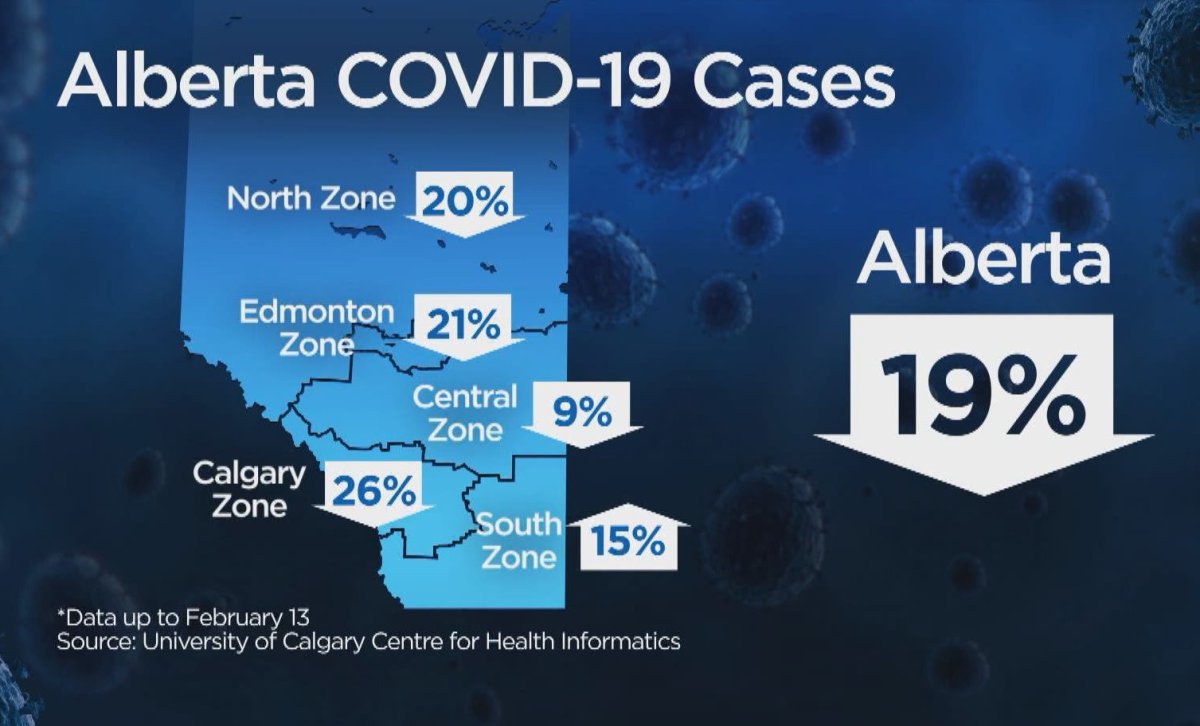The daily case numbers paint a clear picture: Alberta has made big progress in the fight against COVID-19.

The province has also seen the number of people fighting coronavirus in hospitals and ICUs drop as well.
Unfortunately, there is a but, and that is the wildcard of what happens with the spread of new COVID-19 variants.
COVID-19 cases dropping in Alberta
According to the Centre of Health Informatics at the University of Calgary, new cases have dropped 19 per cent week-over-week in Alberta.
The Calgary zone saw the biggest dip, down 26 per cent, but it also has the highest number of active cases. The only place that saw an increase was the South zone.
“It’s certainly great news,” said Dr. Noel Gibney, the co-chair of the Edmonton Zone Medical Staff Association’s COVID-19 pandemic response committee, and a professor emeritus at the University of Alberta.
“There’s absolutely no question the advances that we’ve seen and the drops in the numbers of COVID(-19) cases is directly related to what Albertans have done and what they have sacrificed to get these numbers under control.”
So, what’s next?
When it comes to spread of the original variant, cases are forecast to continue to decline according to a developmental biologist. Dr. Malgorzata Gasperowicz independently tracks and analyzes COVID-19 data in Alberta.
“The original variant is halving every 21 days, so every three weeks,” Gasperowicz said.
New variants concern
While cases of the original variant have been consistently dropping, cases of new variants are climbing.
As of Friday, there were 171 cases involving new variants in Alberta. Two weeks earlier, on Feb. 1, there were 51 cases.
“Everyone wants to get back to their normal lives and this is sitting out there like a dark cloud,” Gibney said.
He acknowledges it’s been a long and tiring fight, but is encouraging Albertans to “try and hang in there a little longer.”
“You’ve done a great job,” Gibney said when asked what his message is to Albertans. “We should be at the point of getting through this, but we’re not there yet, primarily because of the new variants.
“We know that they can move extremely fast as we’re seeing in Newfoundland at the moment,” he added, referring to an outbreak in eastern Canada that saw cases of B.1.1.7 spike on Friday.
“Yes indeed, we’ve done very, very well and everyone deserves huge credit for that, but at the same time, we’re facing a real risk.
“Because if the modelling that we’ve seen to date actually happens and comes true, the third wave of COVID(-19) could be much greater and more serious that the first two waves we’ve just come through.”
Gibney is concerned about what the next step of reopening could mean in Alberta, which would include easing restrictions at places like convention centres and banquet halls.
Step 2 won’t be happening until Mar. 1 at the earliest, as the province has put in a three-week safeguard between reopening phases to track and monitor the impacts.

“I think that the government needs to be very, very careful as we move into the next phase of reopening,” Gibney said. “I think they need to look very carefully at the number of new cases of the new variants, and if they continue to increase at the rate at which they have increased, I would hope that they would consider delaying any further reopening.”
Vaccine concern
The second problem facing Alberta before “getting back to normal living,” is the challenges the province is facing with vaccinations, according to Gibney.
“There’s still a very substantial number of people over 70 (or) over 80 living independently in the community who haven’t yet been vaccinated and they continue to be at high risk,” he said.
As of Sunday, 146,603 vaccine doses had been administered in the province.
The province paused any new first doses for health-care workers in Phase 1A of the vaccine rollout to ensure there’s enough supply for second doses.
Phase 1B has yet to begin, which includes seniors 75 and older and and anyone 65 and older living on a First Nations community or Métis settlement.
Canada’s sluggish COVID-19 vaccination efforts are expected to get a big boost starting this week as the federal government prepares for a ramp-up in the delivery of shots from Pfizer-BioNTech following a month-long lull.
For Alberta, that means the province will have received about 365,000 doses by the end of March.
–With files from The Canadian Press’ Lee Berthiaume






Comments